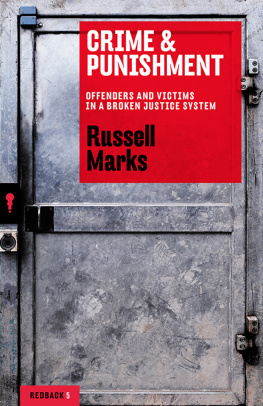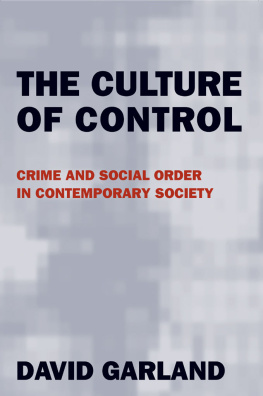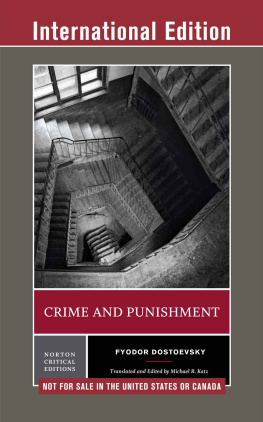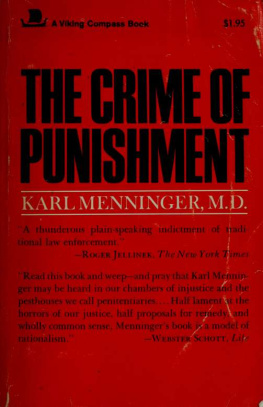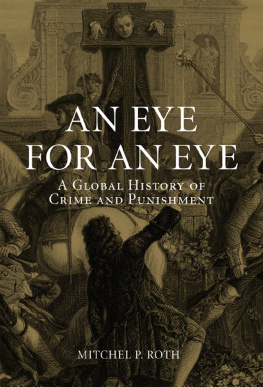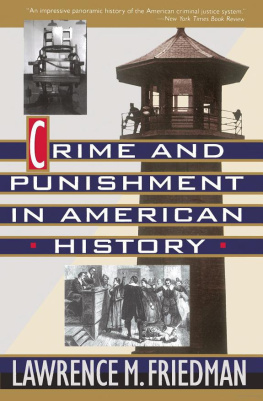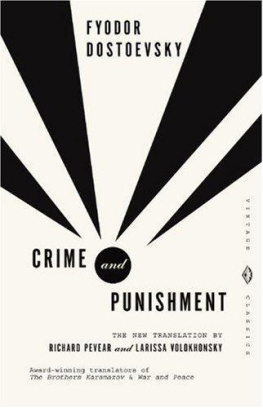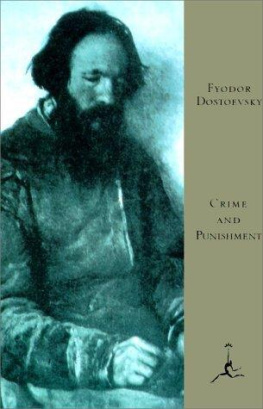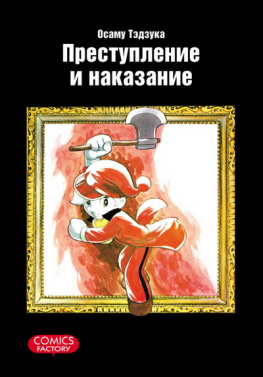
Crime and Punishment in Contemporary Culture
Today, questions about how and why societies punish are deeply emotive and hotly contested. Punishment, it has been contended, is a necessary mode of normative communication among members of a political community. In this innovative book, Claire Grant argues that criminal justice is a key site for the negotiation of new collective identities and modes of belonging. Exploring both popular cultural forms and changes in crime policies and criminal law, Grant elaborates new forms of critical engagement with the politics of crime and punishment. In doing so, the book discusses:
- Teletechnologies, punishment and new collectivities.
- The cultural politics of victims' rights.
- Discourses on foreigners, crime and diaspora.
- Terror, the death penalty and the spectacle of violence.
Crime and Punishment in Contemporary Culture makes a timely and important contribution to debate on the possibilities of justice in the media age. This book is essential reading for undergraduates, postgraduates and researchers interested in the area of crime and punishment.
Claire Grant is Lecturer in Law at the University of London and a graduate of Queens' College, Cambridge. Her other works include Theories of Crime and Punishment (2001).
International Library of Sociology
Founded by Karl Mannheim
Editor: John Urry
Lancaster University
New titles:
Crime and Punishment in Contemporary Culture
Claire Grant
Complexity and Social Movements
Multitudes acting at the edge of chaos
Ian Welsh and Graeme Chesters
Qualitative Complexity
Ecology, cognitive processes and the re-emergence of structures in post-humanist social theory
Chris Jenks and John Smith
Theories of the Information Society, 3rd Edition
Frank Webster
Mediating Nature
Nils Lindahl Elliot
Haunting the Knowledge Economy
Jane Kenway, Elizabeth Bullen, Johannah Fahey and Simon Robb
Global Nomads
Techno and New Age as transnational countercultures in Ibiza and Goa
Anthony D'Andrea
The Cinematic Tourist
Explorations in globalization, culture and resistance
Rodanthi Tzanelli
Non-Representational Theory
Space, politics, affect
Nigel Thrift
Forthcoming titles:
Urban Fears and Global Terrors
Citizenship, multicultures and belongings after 7/7
Victor J. Seidler
Sociology through the Projector
Blent Diken and Carsten Bagge Laustsen
Multicultural Horizons
Diversity and the limits of the civil nation
Anne-Marie Fortier
Crime and Punishment in Contemporary Culture
Claire Grant
First published 2004
Paperback edition first published 2007
by Routledge
2 Park Square, Milton Park, Abingdon, Oxon OX14 4RN
Simultaneously published in the USA and Canada
by Routledge
270 Madison Avenue, New York, NY 10016
Routledge is an imprint of the Taylor & Francis Group, an informa business
2004, 2007 Claire Grant
Reprinted 2007
Typeset in Times New Roman by
Keystroke, Jacaranda Lodge, Wolverhampton
Printed and bound in England by Antony Rowe Ltd, Chippenham
Transferred to Digital Printing 2007
All rights reserved. No part of this book may be reprinted or reproduced or utilised in any form or by any electronic, mechanical, or other means, now known or hereafter invented, including photocopying and recording, or in any information storage or retrieval system, without permission in writing from the publishers.
British Library Cataloguing in Publication Data
A catalogue record for this book is available from the British Library
Library of Congress Cataloging in Publication Data
A catalog record for this book has been requested
ISBN10: 0-415-28175-X (hbk)
ISBN10: 0-415-41409-1 (pbk)
ISBN10: 0-203-98738-1 (ebk)
ISBN13: 978-0-415-28175-1 (hbk)
ISBN13: 978-0-415-41409-8 (pbk)
ISBN13: 978-0-203-98738-4 (ebk)
Contents
This book arises from discussions with colleagues, students and friends, as much as from the reading of texts. I owe a debt of gratitude to a number of individuals who have read and commented upon my work, and opened up spaces in which to speak and write. In particular these have included Ronnie Lippens, John Urry, Derek McGhee, Elena Loizidou, Les Moran, David Garland, Alison Young, Tony Jefferson, Richard Sparks, Beverley Brown, Geoff Pearson, Keith Hayward, Wayne Morrison, Robert Reiner, Richard Jones and Simon Hallsworth.
My work has benefited immeasurably from the hospitality of a number of institutions. I would particularly like to thank some people in Cambridge for providing an exceptionally convivial milieu for scholarship. Queens' College, Cambridge, was home for many years. I would like to express my gratitude to the President and Fellows for the award of my Munro Scholarships, which provided great rooms and tuck, as well as the company of kindly colleagues like Stewart Sage, Jackie Scott, Peter Spufford, John Eatwell, Stuart Bridge, and Brendan Bradshaw. The Institute of Criminology was the locus of my doctoral research and my first ventures in lecturing. I would like to thank all there, and in particular Loraine Gelsthorpe and Anthony Bottoms, who have offered considerable support and inspiration over the years. The Radzinowicz Library and Helen Krarup continue to provide a welcoming place of study, for which I am truly grateful.
A number of institutions have generously awarded me scholarships, research grants, and bursaries. I would like to thank the committees and administrators of the following bodies: the University of Cambridge, the Economic and Social Research Council, the British Academy, the British Society of Criminology, the Leverhulme Trust, and the Law Society. Earlier versions of were published in the British Journal of Criminology and Theoretical Criminology. I would like to thank the publishers of these journals, their editors and reviewers.
My friends and family have been a constant source of pleasure and support over the years. I would like to thank and to salute: Teddy McCollom, Kat Astley, Harriet Neuberger, David Hugh-Jones, Alexander Wedderburn, Lavinia Mitton, Orlando Sayer, Elizabeth Kendal, Bryony Worthington, Louise Watson, Gabrielle Hinsliff, Rupert Thompson, Clare Hayward, Guillaume Metayer, and Kit McCormick. The greatest thanks are due to my family, and to Annabel.
Punishment, culture and communication
He stands, staring down the curve of closed doors, while a fear he knows to be irrational begins to nibble at his belly. A few months ago a fourteen-year-old girl was thrown from a train by some yob who hadn't got anywhere when he tried to chat her up. Miranda's thirteen. This is all rubbish, he knows that. But then, like everybody else, he lives in the shadow of monstrosities. Peter Sutcliffe's bearded face, the number plate of a house in Cromwell Street, three figures smudged on a video surveillance screen, an older boy taking a toddler by the hand while his companion strides ahead, eager for the atrocity to come.
(: 3)
The crime control and penal practices of today unfold in the shadow of monstrosities. On the television, computer or cinema screen, staring out from the cover of the newspaper, and from shelf upon shelf of true crime books and magazines, there they are, the face of the Yorkshire Ripper, the 'House of Horrors' where at least nine young women were killed, the CCTV footage of James Bulger's abduction from a busy shopping mall. These shadowy and macabre images menace a man late to collect his daughter from a railway station. Fearful for her safety, he imagines the horrors of injury and murder evoked by certain remembered images. Images connected with notorious crimes, it seems, become inseparable from the attributed meanings of crime and punishment, and central to their symbolic power. Pictures like these include the faces of murdered children like Megan Kanka, Polly Klaas and Sarah Payne, smiling out from family album snapshots. They live on in memorial legislation, with over fifty US laws in recent years named for children who were victims of violence. Other images bring into the home within minutes, or in real time, the scenes of grave bodily trauma, mental anguish and devastation from the distant site of a terrorist attack. These big news crimes become image events.





